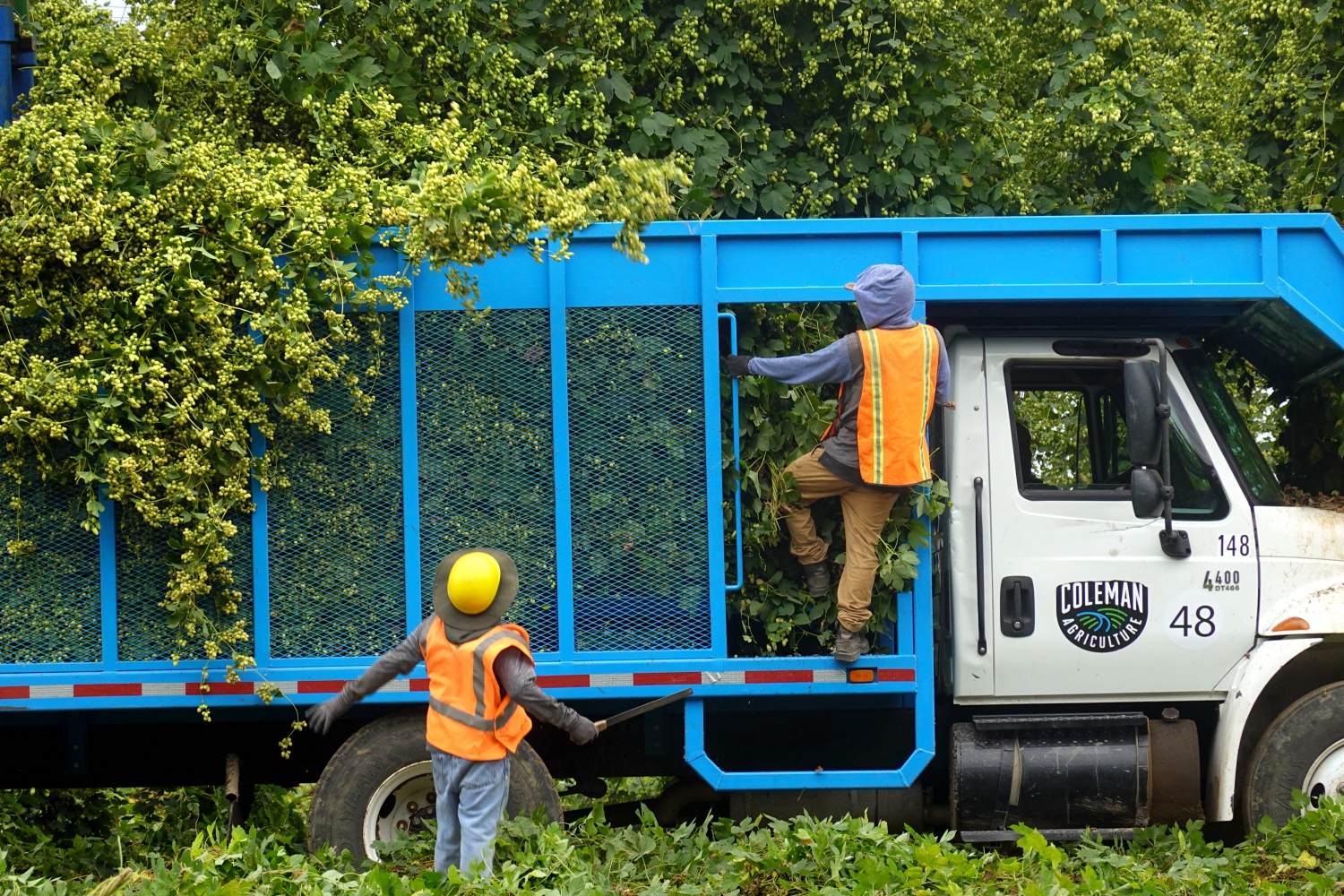

Published on: 10/10/2025
This news was posted by Oregon Today News
Description
September is grape harvest season in the Willamette Valley. For Maria de Lourdes Navarro and her adult son, David Montiel, that means: Wake up at 5 a.m., brew some coffee, pack lunch and be at the job site by seven in the morning. There, they’ll haul heavy buckets of grapes that they cut by hand.
And they’ll usually be back home by early afternoon. How long they work depends on how many boxes the vineyard needs that day, Navarro said.
“When we get back [home], we wash our dirty gloves. And work clothes need to be set aside. We don’t have a washing machine here. So we have to go do laundry elsewhere,” she said while sitting at her dining room table in her apartment.
She’ll usually cook and be in bed by 8 p.m., ready to get up early the next day.

For the last decade, most of Navarro’s mornings have been like this, depending on the season and what jobs they can get by word-of-mouth or through a labor contractor. She and her son have worked preparing and harvesting fields of broccoli, garlic, hazelnuts, pumpkins for Halloween, and Christmas trees.
These days, Navarro and her son are both working 48 hours a week, more or less. Just three years ago, though, they were working far more. Sometimes up to 70 hours a week during the busiest weeks in the summer. And fewer hours means they are making less money – at a time when many of their regular costs are climbing.
It’s a reality many farmworkers across the state are facing, in the aftermath of a change Oregon lawmakers passed three years ago. That’s when the state passed a law requiring employers to pay them overtime. The law sought to limit workplace injuries and boost pay for workers.
Instead, farmers say they can’t afford it – and many farmworkers also say it’s costing them money.
“Suddenly, your paycheck that you could earn $900 or $1,000 a week on, became $600,” said Montiel, as he sat left of his mother. “It’s a big difference in money.”
Even with fewer hours, this work takes its toll on the body, Navarro said.
“El trabajador del campo se acostumbra a vivir con dolor,” she said in Spanish. In English: The farmworker gets used to living with pain.
‘All workers should be treated with dignity and respect’
Under the federal Fair Labor Standards Act of 1938 – a law that established labor protections for many industries – agricultural workers, along with domestic workers, were excluded from receiving time-and-a-half pay after having worked 40 hours a week. It was a Jim Crow-era compromise to keep cheap farm labor in the South.
In 2022, Oregon extended that overtime right to farmworkers with a multi-year phase-in. This year, overtime kicks in after someone works 48 hours a week, and by 2027 it will go down to 40 hours. California and Washington have similar laws on the books.
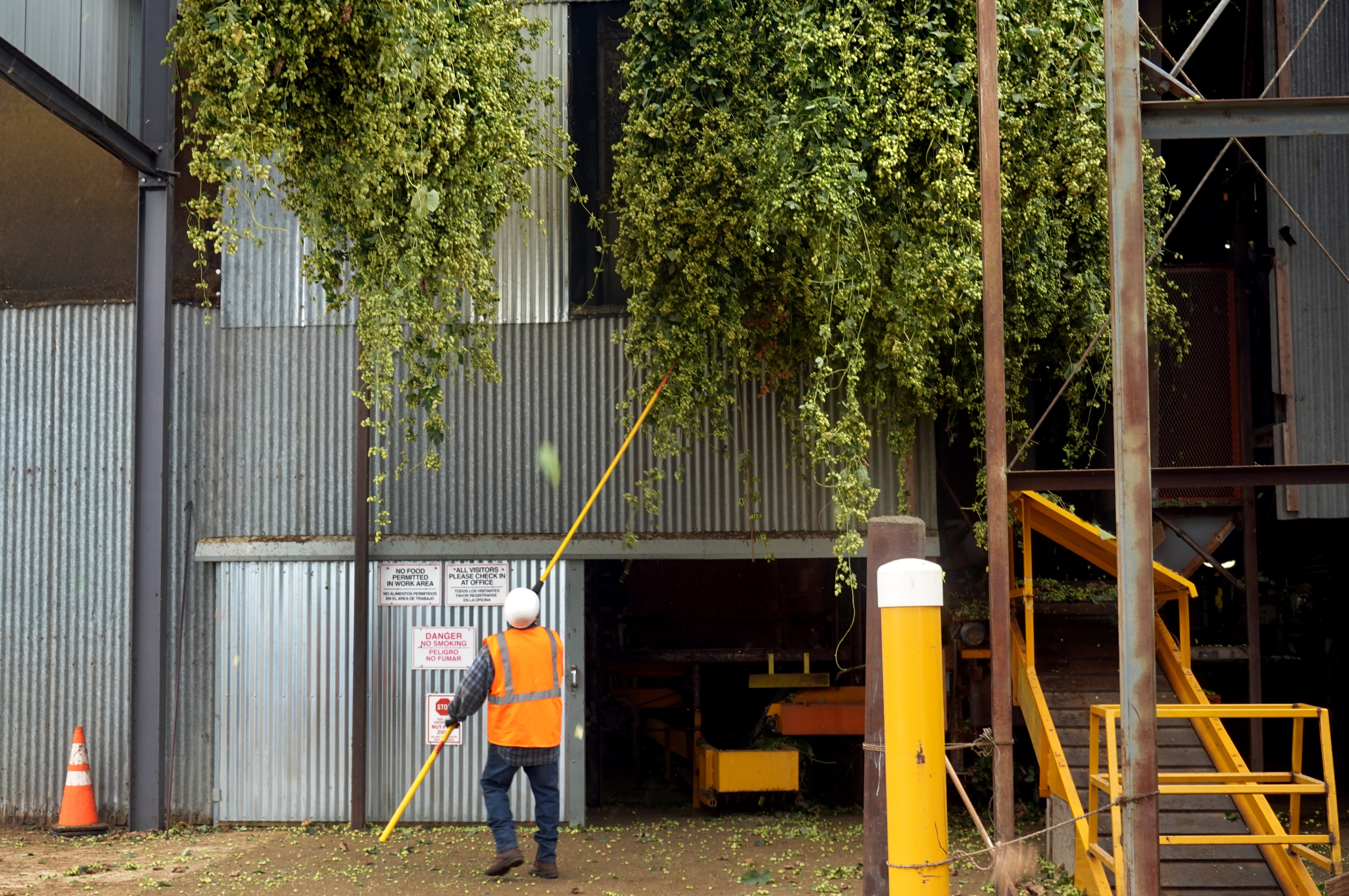
The measure was one of the most divisive of the Oregon Legislature’s 2022 session. The bill passed along party lines, with Democrats overwhelmingly supporting and Republicans opposing it.
Opponents argued the bill was out of touch with Oregon’s farming industry, of which 25% hire farm labor. They said farmers wouldn’t be able to afford overtime amid rising costs of fertilizer, seeds, equipment and other inputs, and would result in family farms going out of business.
But for farmworker groups, the goal was simple, said Reyna Lopez, the executive director of Pineros y Campesinos Unidos del Noroeste, or PCUN, a farmworker advocacy group based in Woodburn.
“All workers should be treated with dignity and respect,” she said. “And that does mean ensuring that they have safe working conditions and that they’re paid a living wage.”
Lopez said this law was meant to level the playing field for agricultural workers, and – in a way – keep people safe.
“Farm work is extremely taxing on the body, and a lot of our fundamental goal around this was to ensure that people didn’t have to work seven days a week to make a living,” she said.
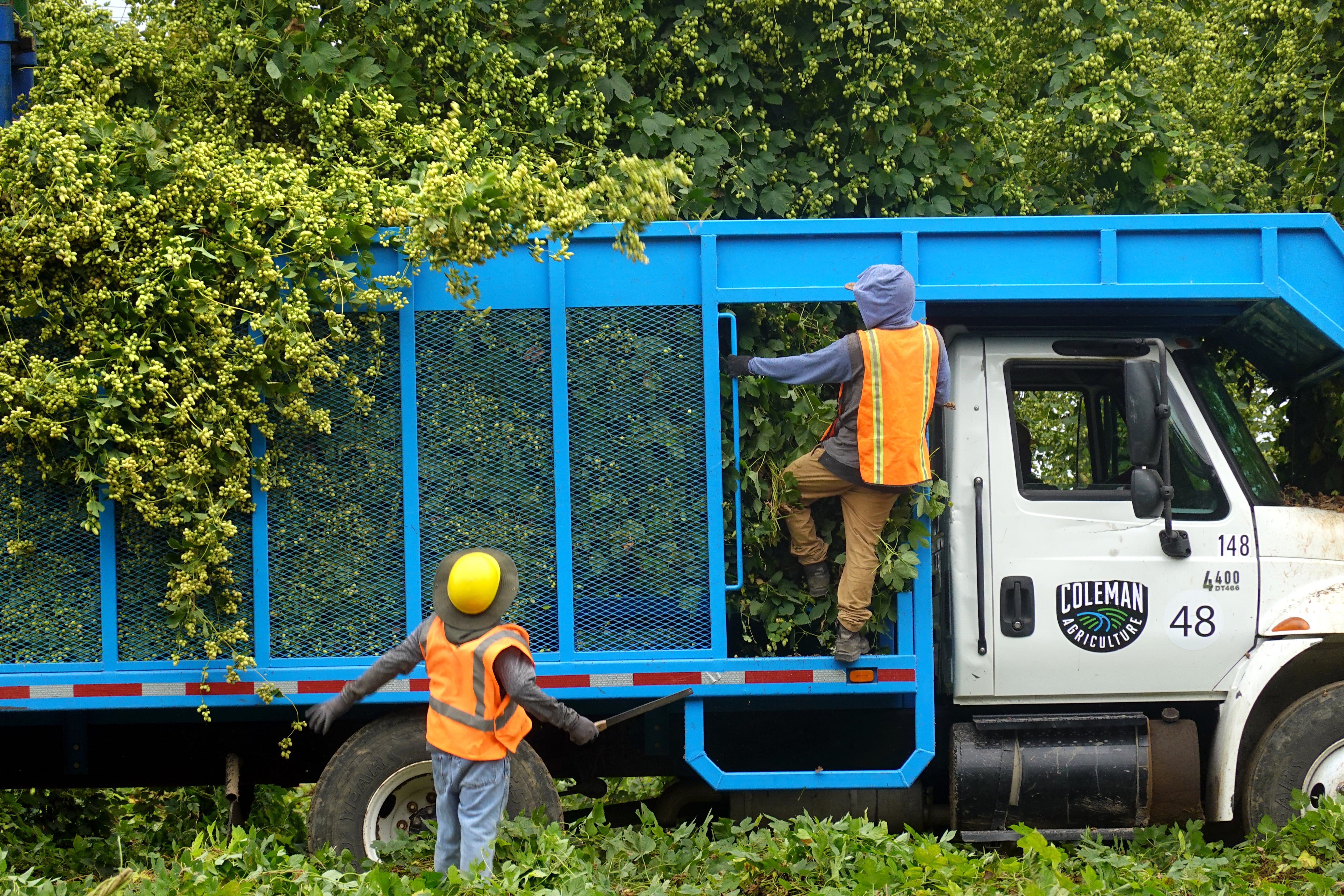
Working 60 or 70 hours a week, which is common for many agricultural workers during the peak of summer, can significantly increase the chances of workplace accidents or injuries, Lopez said. And studies, for years, have found that continually working overtime can contribute to a laundry list of chronic physical and mental health illnesses.
“We really can’t take care of ourselves or our families if we are being worked to the bone,” Lopez said.
Navarro agrees, and remembers being excited when she first learned she’d get paid overtime. But that feeling soon faded.
“Y cuando entró la ley nos cayó la gota fría,” Navarro said, using a Spanish expression to mean they were hit with reality when the law went into effect.
“I totally agree that if we could work eight hours a day and be able to comfortably pay our rent and bills, we would be happy,” she said.
But that’s not what’s happening. Navarro said most employers are just limiting workers to 48 hours a week. She also hasn’t received a raise over the last two years.
And at some job sites, Montiel said, growers are rushing workers to get a job done faster. A job that used to take five hours to complete will now have to be done in three hours, he said.
“The quality of the work changes a lot, because if you don’t want to stay behind, you need to do it however you can,” he said.
All the while, Navarro said, bills are getting more expensive, and they’re due to get their rent increased soon.
“We have to cover our expenses here and cover our family’s expenses in Mexico,” she said. “So we have to work because otherwise, it wouldn’t have made sense to come and separate ourselves from our family and not see our family for so long without having anything to show for it.”
It’s not just agricultural workers that are in a tight spot – so are farm owners.
Max Coleman, a hops grower in St. Paul, Oregon, said the economics of agriculture makes it challenging to afford to pay overtime. Farm work just doesn’t fit into the normal nine to five, 40 hour work week like in other industries, he said
“The difference is for us, there’s also a perishable element,” he said. “If you have tomatoes or hops sitting outside, they’re only good for a certain amount of time, so they have to be picked at that time.”
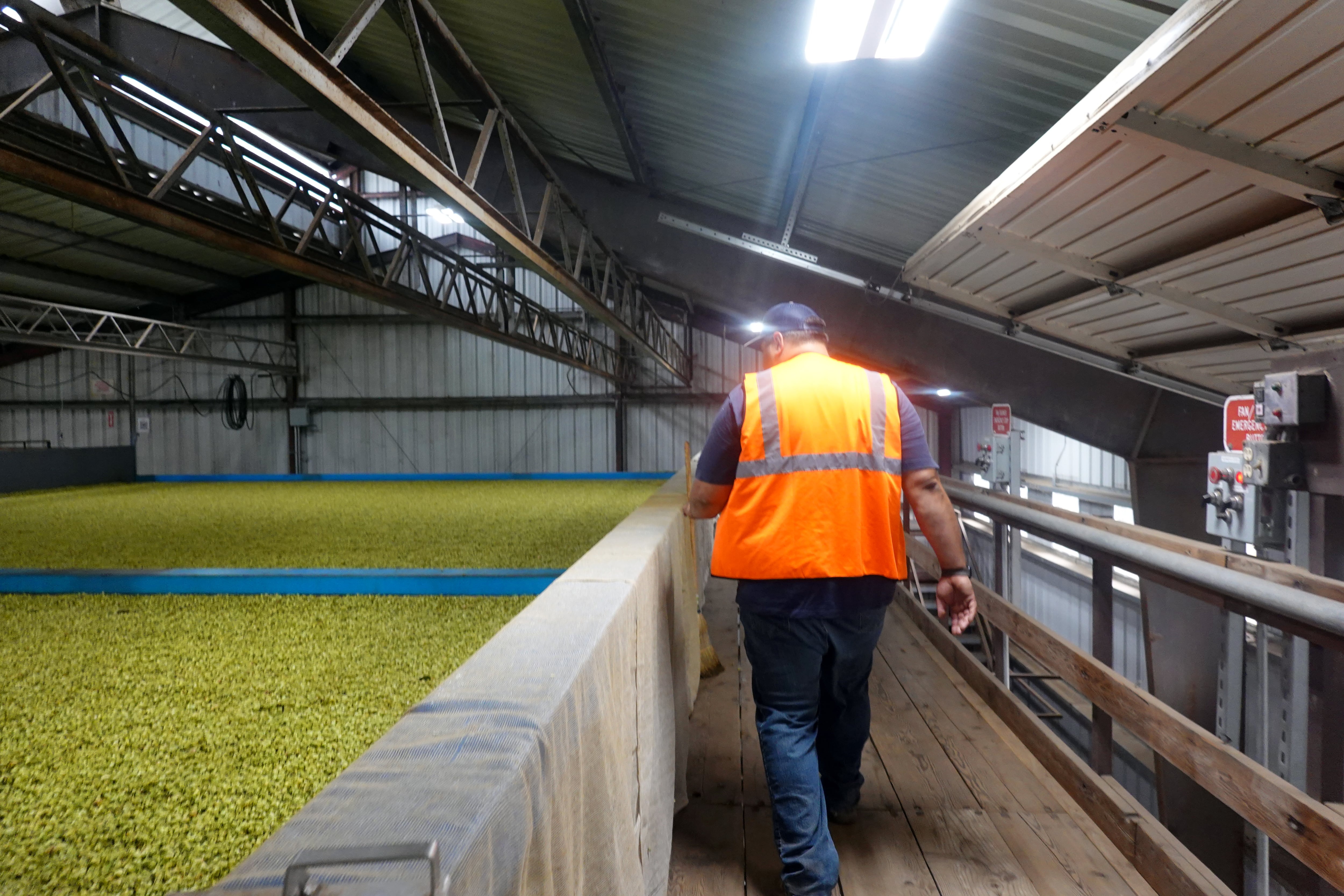
Not only do crops have to be picked during a specific window, he said, but the cost of labor is high. For Coleman, labor accounts for about roughly 40% of the total cost to produce his crop.
Add time and a half pay to the $20 hourly wage Coleman said most workers earn at his farm – some make more – and his margins get slimmer. On top of that, he doesn’t get to raise the price of his crop to make up the difference.
“I can’t go out and sell my hops for more because there’s somebody in Germany or somebody elsewhere in the U.S. that can compete and bring my price down,” Coleman said.
Not only are some growers locked into contracts with a set price for their produce, but Tim Delbridge, an agricultural economist at Oregon State University, said crops are different from other products in other ways as well.
“When you’re dealing with commodities in agriculture or otherwise, your blueberries look the same as my blueberries. You can’t just decide to sell your crop for a higher price because no one will buy them from you,” he said. “Blueberries, cherries, pears or apples don’t really have that differentiation by production location or brand.”
Delbridge said Oregon’s farmworker overtime policy will likely lead to shifts in where a crop is grown. If it can be grown elsewhere in the country or imported from overseas, where labor will likely be cheaper, that’s where the market will go, he said.
“Overtime makes Oregon less competitive as a place to grow,” he said. “So if there’s an alternative, whether it’s another state or another country, it’s going to hit the industry harder.”
There isn’t extensive data available on how the overtime law has affected farmers’ bottom lines.
Delbridge authored an analysis that found agricultural sectors in Oregon will see labor costs rise to varying degrees. It estimates labor costs for dairies will rise 7% at a 48-hour overtime threshold, while cherries will see a 3.3% rise.
The authors of the analysis collected payroll data from five dairies, two cherry farms and three nurseries in Oregon. The Oregon Farm Bureau, Oregon Dairy Farmers Association and the Columbia Gorge Fruit Growers were among the groups that funded the analysis.
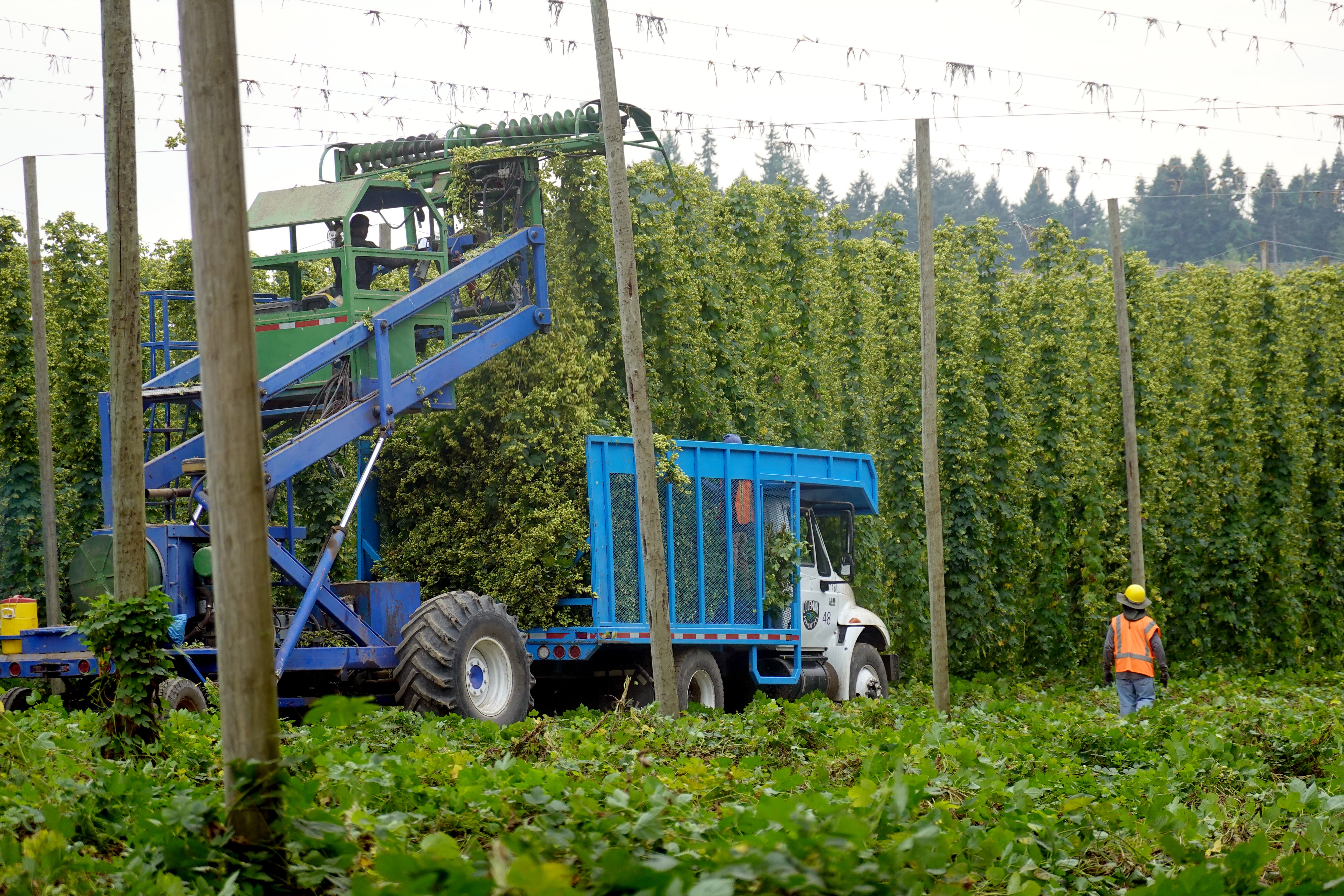
So far, Coleman said, he’s paid time and a half when he figures he can afford it and if he absolutely has to. But he doesn’t think it will be sustainable over the long term, and it will be even harder for smaller family farms.
“We have a little more flexibility than the smaller farms, realistically, because of economies of scale, we can produce a little bit cheaper than somebody who’s a quarter our size,” he said.
Delbridge said he thinks it’s easy to put the blame for farmworkers’ lost wages on growers.
“If we want a sustainable change in the way workers are treated or paid we should voice that to our retailers,” he said. “The reality is that we really do risk harming the agricultural industry and specifically the smaller, less powerful farms with regulation like this.”
Oregon does offer a tax credit for overtime to agricultural employers. It was designed to mitigate the cost of overtime for farm owners. But Jenny Dresler, a spokesperson and contracted lobbyist for the Oregon Farm Bureau, said participating in the tax credit program is burdensome for farmers.
Earlier this year, the Oregon Department of Revenue received 350 applications for tax year 2024 and issued 305 “notices of acknowledgement” letters, with $5.1 million in tax credits awarded. About 8,800 farms hire farm labor in Oregon.
Dresler said she thinks one reason so few farms participate in the program is its short application window, which opens from Jan. 1 through Feb. 2.
“Most farms are family-run businesses and they’ve got a lot of paperwork that is due that month, and so I think it’s hard for them to get to it in that time frame,” she said.
Earlier this year, Oregon Senate Republicans filed at least two bills seeking to repeal farmworker overtime. Neither measure got a hearing in committee.
Oregon state Rep. Ricky Ruiz, D-Gresham, the son of farmworkers, voted “yes” on the overtime bill in 2022. At the time he saw it as a matter of paying workers the fair wages they deserved, he said.
Ruiz remembers his parents earning most of their yearly income during the summer.
He said he would not support a complete repeal of the state’s farmworker overtime law.
“I don’t think that’s the path,” he said. But he would consider proposals floated by farm groups, such as keeping overtime at 50 hours a week, or making a seasonal overtime exception.
“It’s not going to be perfect, but a peak harvest exemption, I think, would be appropriate, given that nine out of 10 farmworkers that I’ve talked to across the state have said ‘I’d rather work more hours than get overtime because I am not getting overtime right now,’” he said.
Farm groups have also lobbied legislators to simplify the agricultural worker tax credit too.
But Reyna Lopez at PCUN said not all workers she represents are willing to take that compromise.
“What they said to me was, ‘Pues cual es el beneficio para el trabajador?’ What is the benefit for the worker?” she said. “For many of us, it goes back to the same thing. You’re asking us to do a really hard job at the peak of harvest, which is in the summer.”
Navarro sees it differently, though.
“I think maybe there’s a middle ground. Maybe we don’t work all the hours we used to, when people worked 12 hours or 11 and a half hours [a day],” she said. “Maybe not anymore, but we shouldn’t be reduced by so many hours either. Maybe 50 hours.”
This summer, for the first time since the law took effect, Navarro received her paycheck for having worked overtime during a single week – she worked 77 hours.
She doesn’t think she’ll see another paycheck like that for a while.
Now the question is whether lawmakers will take another look at Oregon’s farmworker overtime law.
Other Related News
10/12/2025
Thanks Weyerhaeuser for your supportPhotos from Weyerhaeusers post
10/12/2025
If youre new to daily fantasy and want to give it a shot click on our generous Underdog Fa...
10/12/2025
A freeze watch was issued by the National Weather Service on Sunday at 1234 pm valid for T...
10/12/2025
Metro leaders this weekend released a tongue in cheek social media video urging participan...
10/12/2025











